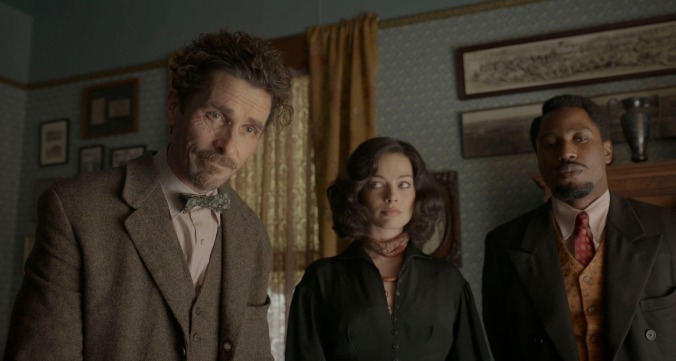David O. Russell's shambolic Amsterdam cranks up the star power but still falls short
Christian Bale, Margot Robbie, and John David Washington, among others, do their best to make sense out of an overly ambitious political potboiler

Amsterdam, David O. Russell’s 1930s-set caper film, zooms along unexpected narrative curves with a tremendous self-confidence it mistakes for grace. In actuality, it’s more of a shamble, like a sloppy guy at a bar telling a farfetched tale signifying not-too-much, but it certainly seems important, to the teller anyway. This does not mean the movie is not worth watching—indeed, much of it is rather funny—but like a return from the pub when a loved one asks if they missed anything, you can say, “Oh, it’s always fun to see the gang, but you didn’t miss much.”
The leader of this film’s gang is Christian Bale, working for the third time with Russell after American Hustle (a better film) and The Fighter (a better film still). Here he plays Burt Berendsen, a kind, doofus Doctor Feelgood who serves up painkillers to fellow World War I veterans. He wears a glass eye, has scars on his face, and (probably due to the frequent ingestion of his own wares) is seen making loopy faces, which Russell and cinematographer Emmanuel Lubezki are eager to shoot in close-up with long lenses, ramping up the cartoon nature of all of it.
His best buddy is a lawyer, Harold Woodsman, played by John David Washington. When Burt was the only soldier during WWI who would take the post leading an all-black division, the two of them forged an unbreakable bond. (Burt’s wife, a very amusing blue-blood Andrea Riseborough, and her father, Star Trek: Deep Space Nine’s Casey Biggs, sent him there, kinda-sorta hoping he’d get killed.)
Both men were wounded in the trenches, and as they convalesced in a French hospital they met an American nurse, Valerie, played by Margot Robbie brimming with joie de vivre and an unusual artist’s eye that teaches our boys how to truly embrace life. (She’s also incredibly connected to international spies—Mike Meyers and Michael Shannon, particularly—which no one questions.) The three quit for Amsterdam; Burt becomes a beloved third wheel to Harold and Valerie, whose love could never exist outside the bubble of bohemian interwar Western Europe. “Amsterdam” is a fondly remembered state of mind.
The scenes in the Dutch capital are all warmly lit interiors, with big windows and art. Alas, if the movie’s title had you hoping for shots of Margot Robbie strolling along canals or alongside windmills, you’ll have to take your Hollandophilic ass elsewhere. Besides, we only catch these moments in flashback, before things go sour into the 1930s, with poverty overwhelming America and a new threat looming in Europe.
Things heat up again when Harold and Burt are visited by a young woman (Taylor Swift!) who is convinced that her father—an important Army man who acted respectfully to the Black troops during the war—did not die by natural causes. Just when we begin to believe her, she too is killed, in a rather surprising manner. The death is pinned on Harold and Burt, prompting them to go scrounging for alibis from society folk who will vouch for them.
Things get messier as the two visit a grand suburban estate and encounter other weirdos like Rami Malek and Anya Taylor-Joy who seem to be involved in a side competition to see who can make wackier googly eyes in the camera. (Malek wins!) Valerie reappears, and as they try to clear their names (and unmask the killers), they discover a conspiracy based on a little bit of historical truth. (Familiarity with the old Humphrey Bogart film All Through The Night will foreshadow the ending a bit.)
Amsterdam is not a great movie by any shakes, although it looks terrific and all of the performances, including turns from Robert De Niro, Chris Rock, Matthias Schoenaerts, Alessandro Nivola, Ed Begley Jr., and Timothy Olyphant, are energetic, entertaining, and enjoyable. (Zoe Saldaña did not get the memo about this movie’s tone; she’s a snooze.)
The problem is that its grand conspiracy theory and unsubtle theme of history repeating itself is trying a bit too hard to be weighty. Yes, this is an important topic (one not need subscribe to too many substacks to know why fear of creeping Fascism is a genuine thing) but the tonal shift from exaggerated camera angles to political dread is a tough one to pull off. Not everyone can be Joel and Ethan Coen, certainly not David O. Russell, whose work continues to operate in their shadow. In Amsterdam, Amsterdam is fondly remembered as an ephemeral heaven on Earth. As the movie calendar marches on Amsterdam is not likely to be remembered by many at all.